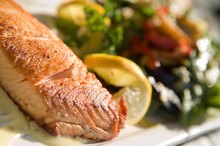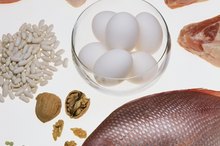Does Protein Help You Heal Faster After Surgery?
Depending upon the surgery, taking steps such as physical rehabilitation and keeping your surgical incision clean can help in your recovery. You also should not neglect your diet. What you eat plays a role in building new cells and repairing injured ones. Because it is present in every cell, protein is one macronutrient you especially need. Always talk to your physician, however, before making any changes to your diet following surgery.
Functions
Protein plays a variety of functions in your body, some of which are specific to healing post-surgery. For example, protein is responsible for building white blood cells and immunoglobulins, types of cells that are necessary for immune system function. The healthier your immune system is, the more equipped you are to heal following surgery. Protein also is the major component of skin and muscle tissue. Collagen, the substance in your skin responsible for building scar tissue, is made chiefly from protein strands. By having enough protein in your diet, your body can create the scar tissue that will repair your incision post-surgery.
- Protein plays a variety of functions in your body, some of which are specific to healing post-surgery.
- Collagen, the substance in your skin responsible for building scar tissue, is made chiefly from protein strands.
Deficiency
Is There an Increased Need for Protein After Knee Surgery?
Learn More
While protein helps you heal after surgery, there is a fine line on whether it will help you heal faster. For example, the more protein you take in does not mean you will heal faster. However, if you are deficient in protein, you are likely to not heal as fast because your body does not have the nutrients it needs. Even if you are on feeding restrictions, it is possible to blend protein powders for use in a feeding tube or on a liquid diet.
- While protein helps you heal after surgery, there is a fine line on whether it will help you heal faster.
Symptoms
Some signs you do not have enough protein in your diet include swelling not associated with your surgery, muscle weakness and thinning hair. You also may find you experience muscle cramping, headaches, anemia and an intolerance to cold. Because you may have the tendency to pass off protein deficiency symptoms as after-effects of surgery, talk to your physician if you suspect your symptoms may be due to lack of protein.
Recommended Sources
The Best Vegetarian Meals for Healing From Surgery
Learn More
While your physician may recommend a specific diet following surgery to minimize nausea from anesthesia or other medications, you can incorporate certain protein sources whenever possible to ensure your wound can heal to the best of your body’s ability. The amount of protein you need on a daily basis will depend upon your weight. For example, most men and women need about 0.8g of protein per kilogram of bodyweight, according to Gloria Tsang, R.D., a dietitian writing for HealthCastle.com. To calculate your protein needs, divide your weight in pounds by 2.2, then multiply by 0.8. One example of needed proteins is glutamine, an amino acid that is a building block of protein and is helpful in wound healing, according to The Diet Channel. Other good protein sources include lean proteins such as lean beef, chicken, fish, seafood, eggs, low-fat dairy and products made from soybeans.
- While your physician may recommend a specific diet following surgery to minimize nausea from anesthesia or other medications, you can incorporate certain protein sources whenever possible to ensure your wound can heal to the best of your body’s ability.
- One example of needed proteins is glutamine, an amino acid that is a building block of protein and is helpful in wound healing, according to The Diet Channel.
Related Articles
References
- HealthCastle.com; Men vs. Women: Differences in Nutritional Requirements; Gloria Tsang, R.D.; October 2007
- Drugs.com: Wound Healing and Your Diet
- Barzel, U. & Massey, L. (1998). Excess Dietary Protein Can Adversely Affect Bone Health. The Journal Of Nutrition. Vol. 128, No. 6. Pp. 1051-1053.
- Friedman, A.N. (2004) High Protein Diets: Potential effects on the kidney in renal health and disease. American Journal Of Kidney Disease. Vol. 44, Issue 6. Pp. 950-962.
Writer Bio
Rachel Nall began writing in 2003. She is a former managing editor for custom health publications, including physician journals. She has written for The Associated Press and "Jezebel," "Charleston," "Chatter" and "Reach" magazines. Nall is currently pursuing her Bachelor of Science in Nursing at the University of Tennessee.









